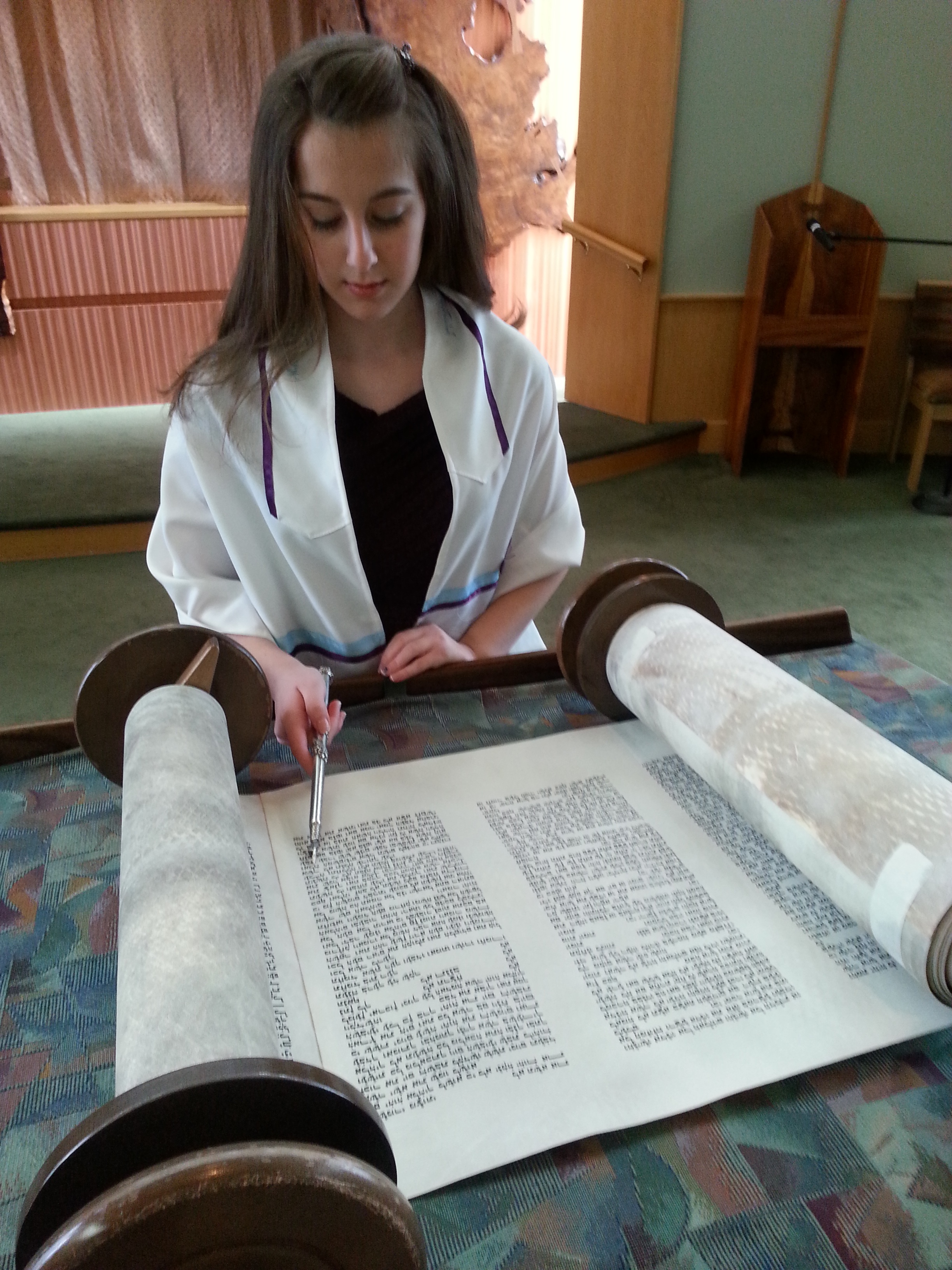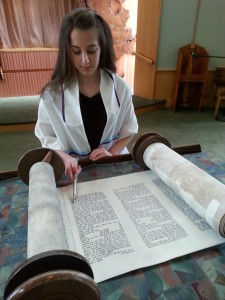
Human Trafficking: A Jewish Response
 Sharing the wonderful words of Torah delivered from the pulpit of B’nai Keshet in Montclair, New Jersey by my daughter on the occasion of her bat mitzvah:
Sharing the wonderful words of Torah delivered from the pulpit of B’nai Keshet in Montclair, New Jersey by my daughter on the occasion of her bat mitzvah:
Listen carefully to this story from the Talmud:
Two people are traveling in the wilderness, and only one of them has a canteen of water. There is only a little bit of water and if they split the water they will both die, but if one of them drinks the whole thing, they will make it back alive to an inhabited area. Rabbi Ben Petura publicly taught:’ Better both should drink and die than that one see their friend’s death,’ but Rabbi Akiva came and taught: ‘Your life takes precedence over the life of your friend’s.
Do you agree with Ben Petura or Rabbi Akiba?
At first I agreed with Ben Petura but then my father asked me an even more difficult question. He said: If I was a mother and my friend was a mother and we both had babies and the babies were both sick and there was only enough medicine for one baby to live. What would I do? I said that I would give the medicine to my child. Then, when I thought about the water, I agreed with Rabbi Akiba who taught that your own life comes first.
What does this story have to do with slavery?
This story teaches us about the choices that people have to make in a world where there isn’t enough food or water for everybody. Before we had refrigerators and supermarkets and Costco and huge farms, people learned to feed their families first in order to survive. They didn’t care very much about people who were not part of their families and they feared people who were not part of their family. This is what I call living in a “survival mode” and it helps you understand that in a life or death situation you would probably pick life even if it costs a death to someone else.
The first humans, to get food, had to hunt and to gather. There was a scarce amount of food and they would steal from others or kill others to get food. This changed when people started to cultivate land and domesticate animals.
People started to settle down in one place. As a result, some people settled in better lands and they became wealthier than others and classes were created. Some people lived in what I would call a “relax mode” instead of a “survival mode”. Because people had a lot of land and bigger houses, they wanted people who were not in their family to work for them.
Slavery was an easy way to do this. If you had land and lived in “relax mode”, you found a person in “survival mode” and traded food, shelter, and water in exchange for a person working for you. The best situation was having slaves who stayed with you a long time and learned how you did the chores and worked hard. How would you get slaves?
If people were homeless, they wanted food and goods. You could say: “be my slave and I’ll take care of you.” If people tried to make war against you and they lost, you could take them as slaves. The children of the slaves would also become your slaves.
The people with the money and the most resources controlled the slaves. This was mostly men. Men formed a patriarchy to control women and slaves. This happened in nearly every ancient civilization.
What happens if your slave does not do their work?
You could say “you don’t get any food!” But if you did that, the slave would become weak and sick. So in order to keep slaves in line, people would physically hurt them to change their behavior. You would beat them. And if that didn’t work, you would kill them and get a new slave if you could afford it.
Things would be even worse if there is a famine. If there isn’t enough food, you would probably want to save your own family first. If you free your slaves, they might form an army and take your food. So you might have to start by killing your slaves. Does this sound like a familiar story that we read each year? If you are thinking about the Hebrews experience in Ancient Egypt right now then you understand why slaves might become a threat.
Now you might be thinking to yourself – Wait!!!!!! Killing innocent people is not o.k. !!!! They didn’t do anything – which is what innocent means!
The first person to have laws about not killing your slaves was Hammurabi. He said that slaves were property. That may sound bad, but it was actually kind of good!
Here is an explanation from Rav Kook, the first chief rabbi of Israel.
Imagine that you own a coalmine. You could hire people for $10 an hour to mine coal. You wouldn’t care about their health because you hire different people everyday. But if you had ten slaves working the mine, you would care more about their health. They are your property. They benefit your life!
Hammurabi was thinking that slavery would always exist, but that laws would help people protect slaves.
The Torah takes this idea even further.
In my parsha, we read that you cannot kill a slave and you cannot injure a slave. God does not want slaveholders to be able to kill or injure their slaves!
There are also special laws for Hebrew slaves. If the slave is a Hebrew, then they are freed in the seventh year of their slavery. If they don’t want to be freed then they get an earring in the top of their ear as a mark that they are now property of the owner.
Also, if you are very poor, you can sell your daughter as a slave but there are laws to protect her. Your daughter would become a wife of the buyer, but not a slave. She can’t be sold off to someone else. If her new husband chooses to have another wife, he still needs to give her the resources she needs to survive.
In general, I think that the Torah’s laws were trying to give the slaves protection. However, I disagree with one of the Torah’s laws.
In the Torah we read: If you hit your slave and the slave dies the next day, you are liable. But if the slave dies two days later, you are not liable. Two days is not a good standard. They probably died because of the rod. If it was longer than that, like a week, it might have been something different that killed them. But really, people shouldn’t be hitting their slaves to begin with.
The big question is: Why didn’t the Torah outlaw slavery?
The Torah did not ban slavery because as Rabbi Jonathan Sacks said, g-d knew that people couldn’t change drastically and change so quickly, so therefore g-d “sets into motion” the ideas that will lead people to abolish slavery later.
Today, all nations have laws that abolish slavery, yet it is not abolished. We still have many people who are living in “survive mode” who are taken advantage of.
In preparation for these remarks, I spoke with Keeli Sorensen, the Director of National Programs of the Polaris Project, the largest organization in America dealing with human trafficking. When people say trafficking many people get confused, as it is a hard subject. I have learned from my interview that Trafficking affects so many people and not just girls, but boys and trans gender kids. Trafficking is when a person is forced to either have sex with someone for money or work under slave like conditions. Work trafficking is when you work on a farm, or as a maid, or sometimes at a hotel and don’t get paid for your labor. If you didn’t catch on, this is modern day slavery, and is happening even in New Jersey. Finding a way for these people to speak up is very hard. The Polaris Project helps by having a hotline and then rescuing people. They help with a place to live, education, and programs that restore people’s self-esteem. Government agencies also help the Polaris project and other groups in the U.S. and around the world. The great thing is that you can help. Visit Polaris Project.org.
In my Torah reading today, one of the harshest penalties is reserved for a kidnapper. Stopping those who traffic in other humans – those who kidnap and enslave in our world, should be a priority for all of us. Many people ask,
“How can I help I am either too young or lost.” You can help whatever age, even if you are just a little kid, tell your friends,” Nobody has the right to hurt you”. You can help out as a teenager by starting a group at your school, or getting your friends to get the apps Eat-Shop-Sleep and Free2Work that help you learn about businesses with labor violations. Teens can help by speaking out and showing that they care about the subject, not just smile and nod. Wink Wink. Adults you have a big one you need to be the mentors, teach kids about the hard subjects and educate yourself on how to help, and make sure that our police enforce the ban on trafficking. The biggest problem all these organizations have is funding. The Polaris project wants to help people but when you don’t have the funding it gets hard. I have chosen myself to give a donation to the Polaris project organization as part of becoming bat mitzvah. This makes me feel that I am impacting lives and getting the world to learn about big issues that people may be scared of.